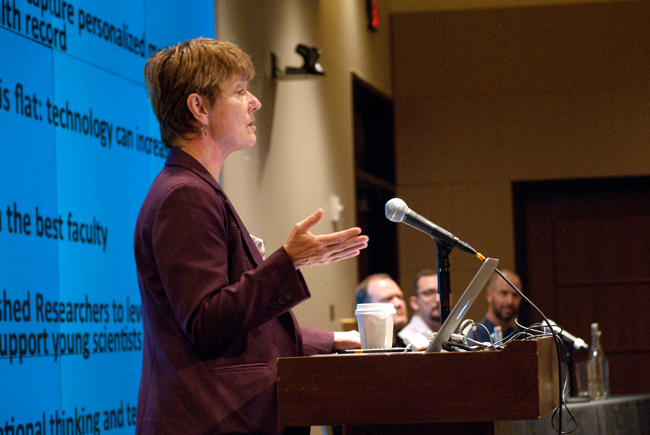University of Texas institutions will not be able to yield the best research and medical breakthroughs without advancing the UT Research Cyberinfrastructure initiative, a panel of experts said Tuesday.
The Austin Forum on Science, Technology & Society hosted its monthly speaker series in the AT&T Executive Education and Conference Center to discuss the benefits digital data, supercomputing and visualization can have on biomedical discoveries.
“The UTRC is going to help manage the data tsunami,” said Patricia Hurn, vice chancellor for research and innovation of the UT System. “Scientists are starting to ask questions for the first time that have enormous amounts of data, questions that are something more than what you would be able to handle in your commodity software or hardware.”
The system is collaborating with the Texas Advanced Computing Center to advance the UT Research Cyberinfrastructure initiative. This initiative will provide the institutions with advanced computational systems, large data storage opportunities and high bandwidth data access between the institutions to facilitate research. The system notes UT SysNet’s plan to ensure a connection between the routers of the 15 UT System institutions, connecting each institution and the three data centers in Arlington, Houston and Austin.
Matthew Vaughn, Texas Advanced Computing Center life sciences computing group manager, said the advanced computational systems will provide researchers with ways to compare, collaborate and further research on recent medical innovations.
“We’re working hand in hand with biomedical researchers to fundamentally change our approach to disease treatment and prevention,” Vaughn said.
Steven Leslie, UT executive vice president and provost and professor in the College of Pharmacy, said the initiative will work with the recent passage of Proposition 1 by attracting medical professionals from around the world. Proposition 1 is an Austin ballot initiative passed in November that will raise property taxes collected by Central Health to help fund a proposed UT-Austin medical school and purchase medical services from students and faculty there for the general public.
“The capacities of computational science will turn research into therapies, and with the sophisticated researchers that will be employed, some of the leading minds in the world have already said they want to be in Austin, Texas,” Leslie said.
Hurn said the initiative’s technology improvements will lead to innovations useful to citizens as well as researchers, such as electronic health records that will allow individual health care to be accessible regardless of location.
“These innovations are ubiquitous throughout science and I believe this is where the future is,” Hurn said.
Printed on Wednesday, Dec. 5, 2012 as: Experts advocate for Research Cyberinfrastructure





















